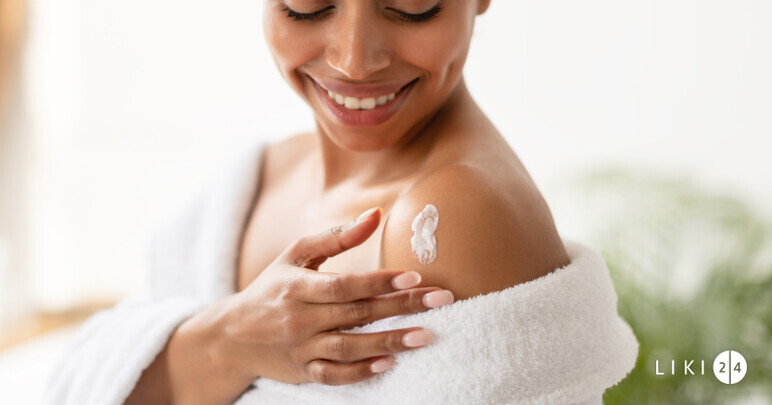The importance of sunscreen
Why sunscreen is essential
Sunscreen plays a crucial role in protecting your skin from harmful ultraviolet radiation. The sun emits two main types of UV rays that affect the skin: UVA and UVB.
- UVA rays: These rays penetrate deep into the skin and contribute to premature ageing, causing wrinkles and loss of skin elasticity. They can also penetrate through windows and clouds, affecting the skin even on cloudy days.
- UVB rays: These rays affect the superficial layer of the skin and are the main cause of sunburn. They also contribute to the development of skin cancer. UVB rays can interact directly with DNA and are considered the most harmful UV rays.
Both UVA and UVB rays can damage the skin. Sunburn is a sign of short-term overexposure, while premature ageing and skin cancer are side-effects of prolonged exposure to UV rays. The use of adequate sunscreen is crucial to prevent these harmful effects and to maintain healthy, youthful-looking skin.
The negative effects of sun exposure
Prolonged and unprotected exposure to the sun can have numerous negative effects on skin and overall health:
- Premature skin aging: UVA radiation degrades collagen and elastin in the skin, leading to wrinkles, fine lines and loss of skin firmness. This process, known as photoaging, can add years to the appearance of the skin.
- Sunburn: UVB rays can cause painful sunburn, characterized by redness, heat and skin sensitivity. Repeated sunburn can increase the risk of skin cancer.
- Hyperpigmentation: Exposure to the sun can stimulate melanin production, leading to pigmentation spots and melasma. These spots can persist for a long time and can be difficult to treat.
- Skin cancer: Cumulative exposure to UV radiation is a major risk factor for all skin cancers, including melanoma, basal cell carcinoma and squamous cell carcinoma. Melanoma, the rarest of the skin cancers but the most dangerous, is linked to severe exposure to the sun's UV rays from an early age. Proper sun protection can significantly reduce this risk.
Important! There are three types of UV radiation: UVC, UVB and UVA. The ozone layer can absorb 100% of UVC, 90% of UVB and a minimal amount of UVA, which is why ozone depletion increases UV transmission. Make sure your chosen SPF provides broad spectrum coverage (UVA and UVB rays)
Types of sunscreen products
There is a wide range of sunscreen products on the market, each formulated to meet specific skin needs. Choosing the right product can make a significant difference in the effectiveness of the protection offered.
Face sunscreens
Facial skin is more delicate and more exposed to the sun than other parts of the body, so it needs special protection. Most facial sunscreens are formulated to be non-comedogenic, which means they do not clog pores or cause acne. They are available in different textures and formulas to suit different skin types and preferences.
A face SPF of at least 30 is recommended for daily use. For outdoor activities or prolonged sun exposure, an SPF of 50 or higher is ideal. Face products are available in creams, lotions, gels, gels, sprays and even powders, tailored for different skin types and specific needs. SPF sprays are handy for reapplying several times throughout the day.
- SPF for oily skin
People with oily skin need to be careful when choosing sunscreens to avoid an oily feeling or excessive shine. SPF for oily skin is formulated to control sebum and provide a matte finish. These products often contain ingredients such as zinc oxide or titanium dioxide, which absorb excess oil and reduce shine.
- Korean SPF
Korean sunscreens have gained global popularity for their innovative and effective formulas. Korean SPF is known for their lightweight textures and skin-friendly ingredients such as plant extracts (rice, green tea) and antioxidants. These products are designed to fit seamlessly into your skincare routine, offering effective protection without leaving a greasy or whitish film.
Body sunscreens
A body sunscreen is essential, especially in summer when skin is more exposed. Sunscreen should be applied to all exposed areas of the skin, including the arms, legs and neck. Lotions and sprays with SPF 30 or the ideal SPF 50 sunscreen are needed to protect the skin against sunburn and sun damage. These products are often water-resistant to provide protection during outdoor activities and swimming.
Creams for children
Children's skin is more sensitive than that of adults and requires special protection. A sunscreen for childrenshould be hypoallergenic, non-toxic and free from parabens, fragrances or other irritating chemicals. An SPF 50 is recommended and products should be water-resistant to cope with swimming and water play.
Creams for different skin types
Each skin type has specific needs and choosing a sunscreen should take these into account. For example:
- Sensitive skin: Choose hypoallergenic products with soothing ingredients such as aloe vera, without fragrances, alcohol or parabens.
- Dry skin: Opt for moisturizing products that contain oils and emollients. For extra hydration, you can also opt to apply a moisturizer after sunbathing.
- Normal skin: You can choose from a wide range of products depending on your personal preferences, such as those with antioxidants that protect the skin from free radicals. Many sunscreens include antioxidants such as vitamin C, vitamin E, silymarin and green tea polyphenols.
- Oily skin: Non-comedogenic, non-greasy, mattifying, oil-free and fast-absorbing formulas that don't clog pores are needed.
- Mature skin: Choose products that contain anti-aging ingredients such as peptides, vitamin C or hyaluronic acid to fight the signs of aging.
Important! The mechanism of photoprotection can be chemical or physical. Chemically photoprotective products have a chemical structure involving an aromatic compound conjugated to a carbonyl group and allowing absorption of high-energy UV rays. SPF products with a physical mechanism, rely on reflecting and scattering UV light in the same way as clothing
How to apply sunscreen correctly
Applying sunscreen correctly is important to ensure its effectiveness. Here are some essential steps to protect your skin properly:
The correct steps for applying sunscreen
- Clean skin: Start with clean skin to ensure even application of sunscreen. Use a cleanser, micellar water or cleansing gel appropriate for your skin type.
- Apply a generous amount: Most people don't apply enough sunscreen. Be sure to cover all exposed areas, including the neck, ears, feet and any other areas that will be exposed to the sun. For lip protection, you can use a lip balm with at least SPF 30.
- Spread evenly: Make sure the product is evenly distributed on the skin, leaving no uncovered areas. Use gentle, circular strokes to ensure complete coverage.
- Apply before sun exposure: Apply the cream at least 15-30 minutes before going outside to allow for complete absorption and formation of a protective barrier.
When and how often to reapply
Reapplying sunscreen is essential to maintain its effectiveness. Here are some basic rules:
- Every two hours: It is recommended to reapply sunscreen every two hours to ensure effective protection.
- After swimming: Even if the product is waterproof, reapply the sunscreen after getting out of the water.
- After sweating: If you have perspired excessively, reapply the cream to ensure continued protection.
- After toweling off: Wiping with a towel can remove the protective layer of sunscreen, so it's important to reapply after wiping.
Benefits of using SPF
Regular use of sunscreen has many benefits for the health and appearance of your skin. Here are some of the most important:
Protection against skin cancer
Skin cancer is one of the most common forms of cancer, but also one of the most preventable. Regular use of sunscreen can significantly reduce the risk of developing skin cancer. UV radiation is a major risk factor for all skin cancers, including melanoma, basal cell carcinoma and squamous cell carcinoma. Approximately 60% to 70% of melanomas are thought to be caused by ultraviolet (UV) radiation.Effective sun protection can prevent the damage to cellular DNA that leads to cancer formation.
Prevent premature ageing
Sunscreen helps prevent premature skin ageing by blocking UV rays that degrade collagen and elastin and generate reactive oxygen species in the skin. Photoaging is responsible for most visible signs of ageing. To this end, several models have been developed in which human fibroblasts or keratinocytes exposed to subcytotoxic doses of UV rays show cellular senescence characteristics. Daily use of an appropriate SPF can keep the skin firm, smooth and wrinkle-free for longer.
Maintaining overall skin health
Protecting your skin from the sun helps maintain overall skin health. Protected skin is less prone to redness, irritation, pigmentation spots and other skin problems. Using adequate sunscreen helps keep skin looking even and radiant. It also helps prevent skin dehydration and flaking caused by sun exposure.
How to choose the right sunscreen
Shopping for sunscreen can seem overwhelming, given the myriad of options available. Here are some factors to consider to make the best choice for your needs:
Factors to consider
- Skin type: Choose a product that suits your skin type (oily/dry/combination). Skin phototype, determined by the amount of melanin produced in the skin, is also important. Fair-skinned people are likely to absorb more solar energy than dark-skinned people under the same conditions.
- SPF needed: For daily protection, an SPF of at least 30 is adequate. For prolonged sun exposure, choose SPF 50 or higher. The SPF (Sun Protection Factor) is a measure of the amount of solar energy (UV radiation) needed to produce sunburn on skin with sun protection relative to the amount of solar energy needed to produce sunburn on unprotected skin. As the SPF value increases, sunburn protection increases.
- Broad spectrum: Make sure the product offers broad spectrum protection against UVA and UVB rays. Broad spectrum products are essential to protect against all the harmful effects of UV radiation.
- Water resistance: If you plan to swim or exercise, choose a waterproof product. Water-resistant products are labeled "water-resistant" and indicate how long they offer protection in water (usually 40 or 80 minutes).
We wish you young, glowing and protected skin!


 Wellness
Wellness  Fitness
Fitness  Nutriție
Nutriție  Frumusețe
Frumusețe  Frumusețe
Frumusețe  1010 Views
1010 Views 

 Previous Article
Previous Article 







